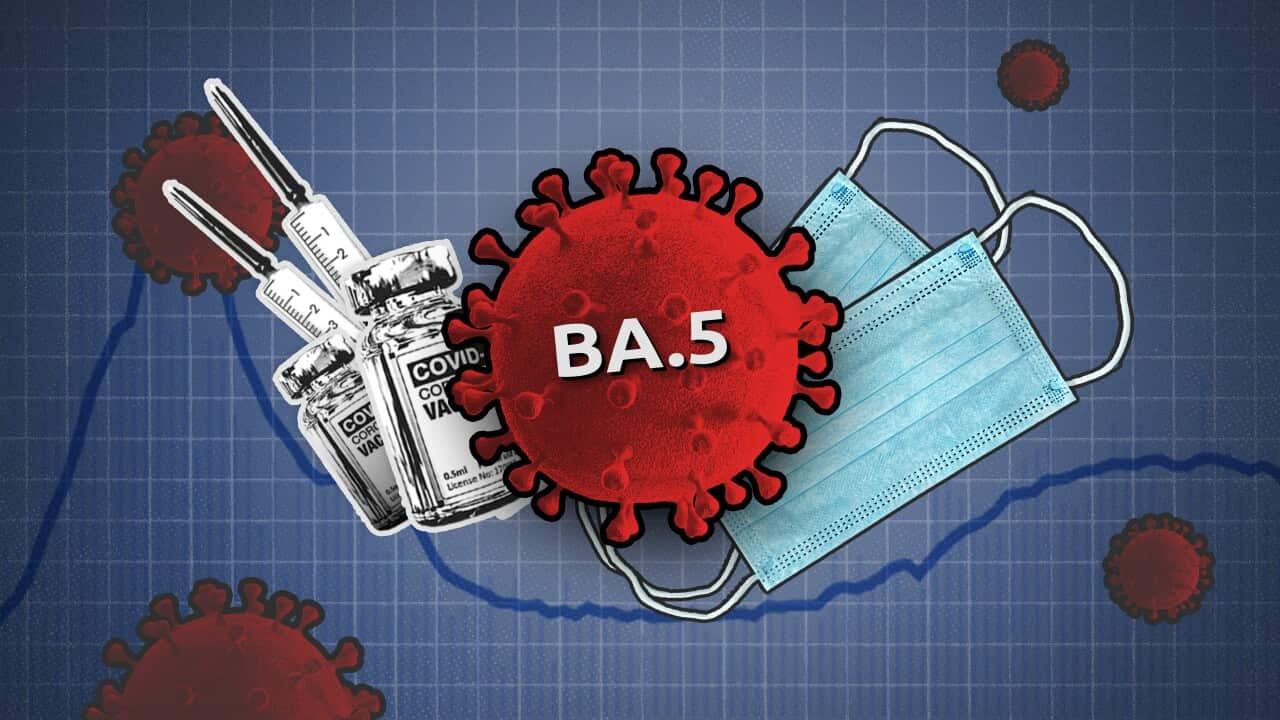As Australia braces for yet another wave of Omicron infections, researchers are questioning whether further COVID-19 vaccinations should be rolled out among the general population.
More than 70 per cent of Australians are "up to date" with their COVID-19 vaccinations – that’s usually one or two initial doses, plus a booster jab.
A second booster dose - usually the fourth COVID-19 jab in total - is currently only recommended for certain vulnerable groups, such as those who are over 65, the severely immunocompromised, and Aboriginal or Torres Strait Islander people aged 50 and older.
But University of Newcastle immunologist Nathan Bartlett said he hoped the eligibility for this would soon be expanded.
"I looked at my vaccine certificate; when I received my third shot – it was in December 2021,” he said.
“By about six months, those antibody responses will have waned, giving very little protection. And it’s clear that reinfections can be worse than the first infection – and that with every infection there’s a chance of long COVID.

The second COVID booster is not currently recommended for the general population. Source: AAP
A key consideration has been the emergence of new Omicron subvariants, and whether it would be more effective to wait for modified vaccines.
Dr Bartlett said he believed it was better to roll out the second booster now, rather than sweating on new vaccines that might not be ready for months.
“I think the situation is becoming increasingly urgent,” he said.
“And if you say, let’s just roll with these viruses – you’ve got more chances of generating new variants anyway.”
Pandemic is not over, prime minister says
On Tuesday, Prime Minister Anthony Albanese spoke to radio 6PR in Perth about the possibility of a fourth COVID-19 vaccination.
"I think it's a question of when rather than whether it will happen," he said.
"We need to make sure people continue to keep up their vaccinations, I know a priority was making sure that people get their third shot, their booster shot because the numbers weren't as high as the health experts would have liked."
"If you're eligible to get a booster shot, get out there and get it done. Because we know that it has a real impact if people do get COVID ... it mitigates some of the impacts for so many people."
Mr Albanese said it was important to recognise the pandemic is not over.
"I met with our leaders in terms of the leadership of the Health Department and others, the Chief Medical Officer, just a short time ago, and I've certainly asked them to look at that issue and also to look at the availability of antivirals as well."
"Because that can have an impact in getting people through (COVID-19) and the symptoms if they do get COVID."
Who should get the second booster?
The Australian Technical Advisory Group on Immunisation provides the government with recommendations on COVID-19 vaccine eligibility.
Its latest advice published in late May reads: “Healthy people aged 16 to 64 years, who do not have a risk factor for severe COVID-19, are not recommended to receive an additional winter booster dose at this time, as their risk of severe illness after their first booster dose is likely to remain very low".

Health Minister Mark Butler has stressed the need to protect children against influenza. Source: AAP / LUKAS COCH/AAPIMAGE
“The protection from three doses is very good, but it's not going to protect people lifelong. So there will be a requirement for additional doses,” Dr Griffin said.
“We are seeing this virus evolve very quickly, and the new variants pose a challenge for us. I do anticipate that we might start to utilise a variant-specific booster perhaps later in this year.”
Federal Health Minister Mark Butler last week warned Australia to prepare for another wave of Omicron cases to sweep the country.
“We’re still dealing with a very serious wave of the pandemic,” he said.
Over the weekend, Australia registered its 10,000th COVID-19 death. Some 40 people on average are dying with COVID-19 every day.
At the same time, Australia has also moved to further relax certain COVID-19 restrictions and requirements. On 6 July, foreign travellers arriving in the country will no longer need to demonstrate proof of vaccination.
On track for record flu season
Doctors are also urging Australians to get vaccinated against influenza, as the country remains on track for a record flu season.
Government figures released last month showed Australia had suffered its worst May on record for influenza. Some 65,000 influenza cases were reported in May – more than double the number recorded during a major influenza surge in May 2019.
As of 19 June, there have been 54 influenza-associated deaths reported in Australia this year.
Mr Butler has said children and adolescents were one of the highest-risk groups when it came to the flu.
“Almost 60 per cent of people admitted to hospital with a condition associated with the flu have been children under the age of 16.
“My message to parents is to protect their kids – particularly those under the age of five – through vaccination.”
Influenza vaccines are available for children six months and older.
Expanded COVID-19 vaccines for children
Australian children aged between six months and five years old will likely soon become eligible for their first dose of the COVID-19 jab.
Regulators in the United States have approved two vaccines for young children, made by drug companies Pfizer and Moderna.
Public health researcher Jane Frawley said it was a matter of time before Australian authorities did the same.
“Parents of children with other health conditions have been eagerly awaiting the approval of this vaccine,” Dr Frawley said.
“But even parents with healthy children, it's advisable that, if and when this vaccine is approved for use in Australia, they should consider getting their healthy kids vaccinated as well.”
for the latest health advice about COVID-19,including vaccination and the current situation in Australia.














